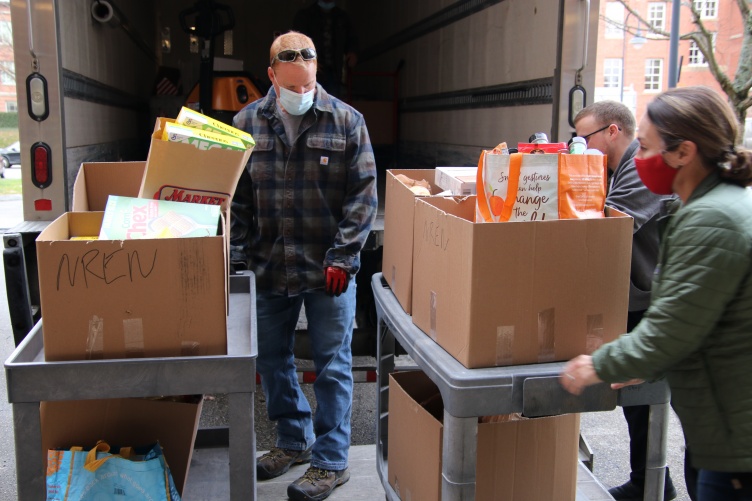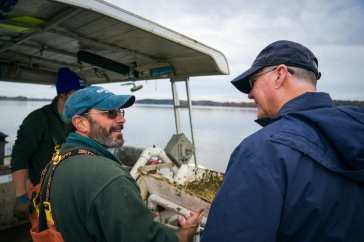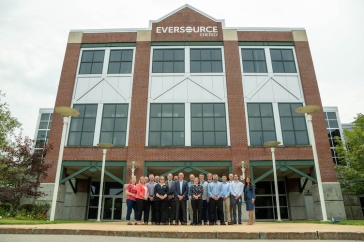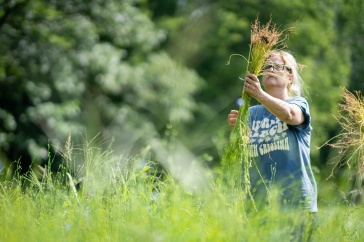
Donated food is loaded onto the New Hampshire Food Bank truck.
The 2021 Food Drive Challenge at UNH, which took place during the first three weeks of November, generated food and monetary donations to the New Hampshire Food Bank totaling the equivalent of 26,285 meals for food insecure individuals and families in the Granite State. Three colleges, the College of Life Sciences and Agriculture (COLSA), the College of Engineering and Physical Sciences (CEPS) and the College of Liberal Arts (COLA), participated, together collecting 3,191 pounds of food and giving $9,643.45 in donations directly to the food bank.
The Food Drive Challenge is an annual event that was held for the first time last year in COLSA at the request of the college’s dean, Anthony S. Davis. The college’s students, faculty and staff donated 3,167 pounds of food to the Waysmeet Center and the St. Thomas More Catholic Church food pantries and gave $5,155 to the New Hampshire Food Bank. The donations represented 12,685.25 meals.
Food Repurposing Project

The annual Food Drive Challenge isn’t the only way students, faculty and staff at UNH are addressing food insecurity in the greater community. COLSA's department of agriculture, nutrition, and food systems, UNH Hospitality Services and Gather, a non-profit food pantry and food distribution network based in Portsmouth, New Hampshire, are working together to get wholesome, edible food that would otherwise end up in a landfill into the hands of food insecure individuals and families in the greater New Hampshire Seacoast. Learn more about the Food Repurposing Project here.
“Lack of food security is a daily concern for many people throughout the region, and it’s been exacerbated by the COVID-19 pandemic,” says Dean Davis. “I am incredibly proud of how our community has come together to increase awareness of this challenge while also helping to ease the burden of hunger and sustain our fellow Granite Staters.”
This year, CEPS and COLA joined COLSA in the effort to address food insecurity in the Seacoast region and beyond.
“I am very pleased that CEPS was able to participate in this year's food drive,” says Cyndee Gruden ’91, ’93G, dean of CEPS. “The food drive to benefit the NH Food Bank has provided the CEPS community with the opportunity to set aside our own challenges to focus instead on helping others during this holiday season.”
The CEPS unit that raised the most for the food drive was the chemistry department, which collected 157.19 pounds of food and donated $949.70 directly to the food bank.
COLA had staff volunteers in eight locations across seven of their buildings and contributed 291 pounds of food and $501.05 in direct donations to the food bank.
“I know that colleagues in the College of Liberal Arts are deeply committed to helping the less fortunate,” says Michele Dillion, dean of COLA. “It was an honor for us to be able to support the NH Food Bank, which does such impactful work year-round in the community.”
Within COLSA, a golden gourd is awarded to the department that collects the most donations. This year, the prize went to the department of agriculture, nutrition and food systems (ANFS), which raised the equivalent of 5,033.6 meals and bested last year’s winner, the department of natural resources and the environment. Dean Davis also made a $500 donation to the food bank in honor of ANFS’s performance.
“We are so grateful for the incredible generosity of the University of New Hampshire community,” said Eileen Liponis ’95G, executive director of the New Hampshire Food Bank. “Approximately 1 in 9 people here in the Granite State face food insecurity – these are our friends, neighbors, classmates and colleagues. With the funds and food donated through this drive, the New Hampshire Food Bank will be able to provide meals to many of our friends and neighbors who are experiencing hunger.”
-
Written By:
Sarah Schaier | College of Life Sciences and Agriculture



















































